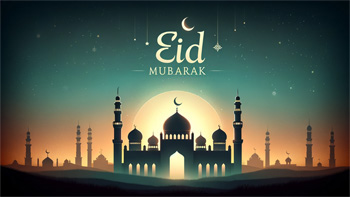 Eid al-Adha in Pakistan
Eid al-Adha in Pakistan


Eid al-Adha, known as the 'Festival of Sacrifice', is one of the most significant Islamic festivals and holds a special place in the hearts of Pakistanis. Celebrated with great reverence and enthusiasm, Eid al-Adha in Pakistan is not just a religious ritual but a cultural phenomenon that showcases the country's rich traditions and religious devotion. This festival, which occurs on the 10th day of Dhu al-Hijjah in the Islamic lunar calendar, is marked by special prayers, animal sacrifice, and acts of charity, reflecting deep-rooted religious beliefs and communal harmony. This article explores the various aspects of Eid al-Adha in Pakistan, including its religious significance, traditional practices, and the unique ways in which it is celebrated across the country.
The Religious Significance of Eid al-Adha
Eid al-Adha commemorates the willingness of Prophet Ibrahim (Abraham) to sacrifice his son as an act of obedience to Allah's command. Before he could carry out the act, Allah provided a ram to sacrifice instead. In commemoration of this intervention, animals are sacrificed ritually during this festival. The act of sacrifice symbolizes obedience to Allah and the willingness to give up what is precious. For Muslims in Pakistan, this festival is a reminder of Ibrahim's obedience, serving as a symbol of their readiness to give up personal desires for the greater good.
Celebrations and Customs of Eid al-Adha
In Pakistan, Eid al-Adha begins with a special prayer (Salat al-Eid) performed in mosques and open spaces across the country. People dress in new or their best clothes, and it's customary to exchange greetings and blessings. The ritual of sacrificing an animal, usually a goat, sheep, cow, or camel, is an integral part of the celebration. The meat from the sacrifice is divided into three parts: one share is given to the poor and needy; another is kept for home; and the third is given to relatives, friends, and neighbors. This distribution ensures the spirit of sharing and caring for others, a key tenet of Islam.
Cultural Aspects and Family Gatherings
Eid al-Adha in Pakistan is also a time for family reunions and social gatherings. Families come together to share meals and spend time with each other, strengthening familial bonds. Traditional dishes, particularly those made from the meat of the sacrificed animal, are prepared and enjoyed during family feasts. Children, dressed in new clothes, enjoy receiving Eidi (gifts of money) from elders. The festival also sees an outpouring of generosity towards the less fortunate, with many participating in charitable activities.
Economic and Social Impacts
The festival has a significant economic impact, particularly in the livestock sector. The buying and selling of animals for sacrifice create a surge in economic activity, providing a livelihood for many. Markets come alive with vendors and buyers, and the hustle and bustle add to the festival's spirit. Socially, Eid al-Adha fosters a sense of community and belonging. It brings together people from various social and economic backgrounds, promoting inclusiveness and mutual respect.
Traditions and Innovations
While traditional practices dominate the celebration of Eid al-Adha in Pakistan, there is also room for innovation and change. In recent years, online services for booking and delivery of sacrificial animals have gained popularity, reflecting the country's adaptability and technological advancement. There is also growing awareness and emphasis on ensuring that the sacrifice is performed in a humane and hygienic manner, in line with both religious injunctions and modern sensibilities.
Eid al-Adha in Pakistan is a vivid reflection of the country's commitment to its religious traditions and the unifying power of shared celebrations. It is a time when the values of sacrifice, charity, and communal harmony are vividly brought to life. The festival transcends mere religious rituals, becoming a profound cultural event that strengthens the bonds of community, family, and nationhood. In celebrating Eid al-Adha, Pakistanis not only honor their religious heritage but also reaffirm their solidarity and commitment to helping those in need. This festival, with its deep spiritual significance and vibrant cultural expressions, remains a cornerstone of Pakistan's identity and a beacon of hope and togetherness in an increasingly complex world.